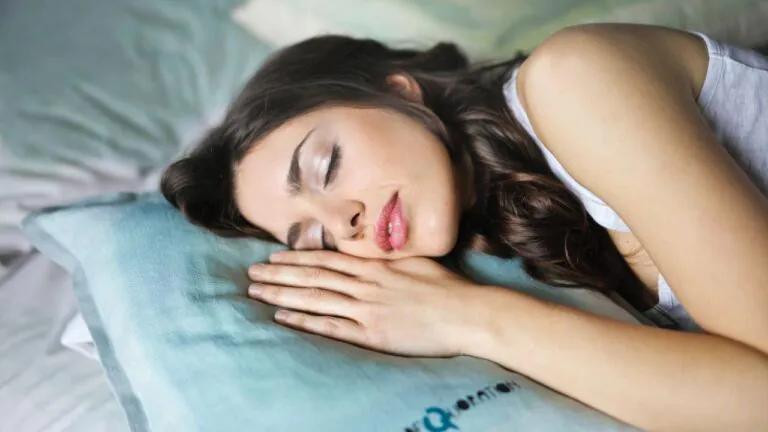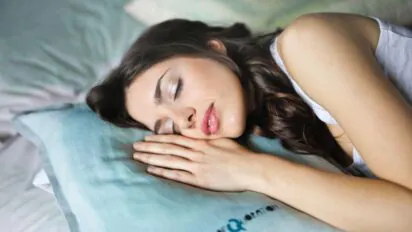All content on this website is for informational purposes only, and is not intended to be a substitute for professional medical advice, diagnosis or treatment. If you have questions about your medical condition or treatment, always seek advice of your physician or other qualified healthcare professional.
Sleep is Essential for Health (1)
When you first fall asleep, your body prepares to shut itself down. During this first stage, it’s easy to be woken up by noises, a busy mind or those jarring moments when you’re woken up because you feel like you’re falling. This first stage is essentially the bridge between being awake and being asleep.
After a few minutes of this, you will pass into another form of light sleep, known as stage 2 Non-REM sleep. During this second phase, your breathing and heart rate slows down and you become less aware of the world around you. This stage is referred to as true sleep. However, it is also considered light sleep and if you are woken up during this phase, you won’t even know you were asleep at all!


Nearly 0%
of your sleep cycle
During this phase you are passing into slow wave sleep or deep sleep. Your breathing and heart rate are at their lowest levels, and muscle activity decreases. Deep sleep is a very refreshing type of sleep, and it is particularly important in helping the brain process information.


Eventually, this will lead into rapid eye movements (REM) sleep. This takes its name from the movement your eyes make behind closed lids. During the REM stage, your breathing rate and blood pressure rise, your brainwaves are similar to what it was in light sleep but all your voluntary muscles become paralyzed so that you cannot move your limbs.
It is during this stage of sleep that we experience dreams.


0 to 5
episodes of REM sleep per night
0-90 minutes
after falling asleep, dream sleep starts
Insomnia (5)
Insomnia is a common sleep disorder, where you’ll find it difficult to fall asleep or to stay asleep. It’s a great source of frustration for millions of people that can lead to decreased energy levels, general fatigue, decreased concentration, negative moods and decreased performance in your daily life. If you are generally averaging six or fewer hours a night of sleep, and take half an hour or more to fall asleep when you get into bed, it’s possible that you might have some level of insomnia.
These are some, but not all the symptoms you might experience when you are suffering from insomnia:
- Difficulty falling asleep at night
- Waking up during the night
- Waking up too early
- Not feeling well rested after a night’s sleep
- Daytime tiredness or sleepiness
- Irritability, depression or anxiety
- Difficulty paying attention, focussing on tasks or remembering
- Increased errors or accidents
- Tension headaches
These are some, but not all of the factors that may lead to you experiencing trouble with sleeping:
- Mental disorders like high levels of stress, anxiety or depression could lead to trouble sleeping
- Working night shifts, having irregular sleeping hours or travelling a lot through different time zones could affect your sleep patterns
- Change in work environment or work schedule
- Medical conditions affecting your breathing or causing pain
- A lack of physical activity or exercise
- Certain medications may affect your sleep pattern
- Overall bad sleeping habits (See section on Sleep Hygiene for more)
- If you are a woman, the hormonal changes your body goes through could affect your sleep, and many pregnant women are affected by sleeping difficulties, whereas menopausal women often can’t sleep because of hot flashes
- If you are over the age of 60 you may suffer from insomnia due to the decrease in melatonin in your body and the changes in your health and sleep patterns
- Other sleep disorders (for more information on sleep disorders, please consult your doctor or healthcare provider)
In the short-term, insomnia can affect your performance at work or during everyday tasks that many take for granted. Even just reducing your sleep by as little as one and a half hours for one night can have a significant effect on your general alertness and effectiveness, and it can have a cumulative effect.
Tossing and turning at night can also disrupt your partner’s sleep, which can lead to stress in the relationship. Additionally, sleep deprivation can affect your memory and impair your mood and general cognitive ability.
In the long-term, an accumulated lack of sleep can seriously affect your quality of life as a whole, making you less capable of engaging in social situations, adding to bouts of depression and even affecting your ability to drive or operate machinery, which could lead to personal injury.
How to prevent health burden? (5)
The greatest gift you can give yourself and your loved ones is a healthy you. Take care of your body and focus on living the highest quality of life you can through your daily choices.
At Acino, we have longstanding knowledge which we want to share with you. Explore our materials to raise your awareness, and make decisions to stay healthy and improve your quality of life.
When insomnia starts affecting the quality of your life, you should consider speaking to your doctor or healthcare provider. Your doctor or healthcare provider could help determine the root cause of your sleep troubles and whether or not you have a sleep disorder that will need intervention or if your insomnia could be treated with medication.
If you suffer from any of the symptoms mentioned on this site, consider consulting your doctor or healthcare provider to find out about treatments and solutions that might help. Sleeping is just as important to your health and general well-being as food and water, so don’t ignore the problem if you’re battling through fatigue. There is help available.
Non-pharmacological solutions include maintaining good sleeping habits, but if that doesn’t help, you can speak to your doctor or healthcare provider about other options to help restore your natural sleep rhythm. Ask your doctor how to Sleep well, Live well.
Sleep hygiene has nothing to do with being clean (although taking a bath does help). It is a term used to describe all those habits and behaviours that could help you get a good night’s rest. Good sleep hygiene is a gateway to sweet dreams and can even help your overall health.
If you are suffering from sleep difficulties there are some things that you can do and avoid doing in order to help you get a better night’s sleep. Some of these are common sense, and others may even surprise you – so give them a try and see what works for you.
Do’s:
- Go to bed at the same time every night and get up at the same time every morning. This will set your natural body clock, making your body used to it
- Get some natural light during the day and spend as much time as possible outdoors. Our bodies need it to help produce melatonin, which in turn helps us sleep better at night. Sunlight early in the morning also helps synchronise your body clock
- Make sure you have a good sleep environment with a comfortable bed in a quiet, dark room. You spend ⅓ of your day in bed, so make sure it is comfortable and that you are not too cold or too hot.
- Make sure that your bedroom is used for only two things – sleeping and sex. Our brains associate certain activities with certain rooms, so if you use your bedroom for anything else, you will struggle to fall asleep.
- Remove TVs, computers and other gadgets from your bedroom – it stimulates your brain activity and makes it harder for you to fall asleep.
- Check the labels on your medication to make sure you won’t be taking anything at night that could be hindering your sleep. Certain over-the-counter medications, including cold or allergy medication can keep you awake. Make sure you take medications as directed – speak to your doctor or healthcare provider if you are unsure.
- During the day, be as active as possible. Exercise regularly but avoid strenuous exercise in the late evenings.
Do something relaxing just before bed, like reading a book or taking a warm bath. A warm bath raises the body’s temperature and then when it falls, it makes you sleepy.
- Lose weight if you are overweight or obese as it can negatively impact your sleep.
- Keep a sleep diary to help determine what positively or negatively affects your sleep.
Don’ts
- Even though exercise is good for you, you shouldn’t do it just before going to bed – it stimulates the body and may make it harder to fall asleep. Try to do the last of your exercise before dinner.
- Don’t stay in bed if you are still awake after more than 20 minutes. Get up and go do something else – preferably something boring – in another room and then return to your bedroom to try again.
- Don’t go to bed feeling hungry – but don’t indulge in a heavy evening meal as this could cause heartburn and lead to weight gain.
- Don’t discuss or analyse problems in bed. Also, don’t play computer games or work at night just before going to bed – this will stimulate your mind and make it difficult to fall asleep.
- Don’t smoke or drink alcohol, especially in the evening.
- Avoid caffeine (coffee, tea, certain soft drinks, chocolate) for at least 4-6 hours before bedtime.
- Don’t share your bed with pets or children.
- Don’t stare at the clock all the time.
- Don’t take naps during the day as this will make you less sleepy at night.
- REM, rapid eye movement; NREM, non-rapid eye movement;